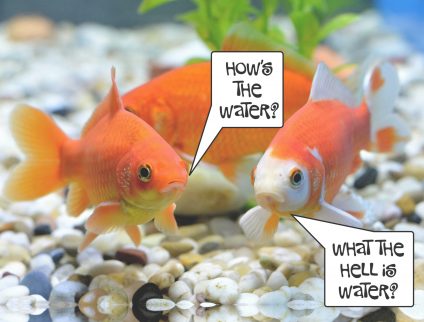
A joke:
First Fish: “How’s the water?”
Second Fish: ”What the hell is water?”
What applies to fish and water also applies to humans and culture. When you’re surrounded by it, you are often unaware that it is there. Hence most of us are oblivious to the culture of therapeutic parenting within which we have been immersed.
What’s therapeutic parenting? It’s a view of children (and their needs) as well as parents (and their responsibilities) that is informed by our therapeutic culture.
According to Aubry and Travis in their book Rethinking Therapeutic Culture:
[The] therapeutic orientation is so prevalent that we rarely question or examine it. It is now a matter of common sense that people are defined primarily not by their social roles, their class status, or their political commitments but by their interior feelings… This investment in the private emotive self means that immediate familial relationships become the key to understanding not only personal identity but also each person’s potential for success or failure.
Therefore:
[T]he cultivation of such a self is not merely a personal good, but a social obligation, the central purpose of human existence.
As a result, childhood has come to be viewed as the prism through which we should seek understanding of personality and parenting has come to be understood as the cultivation of the child’s interior feelings.
This view — while considered obvious by many of us — actually reflects a radical re-thinking of the both the parent child relationship and the meaning of negative emotions. Prior to the 20th Century, no one believed what we now unthinkingly accept as true.
Consider the idea that child suffering results in psychological damage. It rests on several beliefs that are historically quite new:
– the belief that suffering is not inevitable
– the belief that suffering causes damage, not improvement
– the belief that present unhappiness is caused by childhood psychological damage
Let me be very clear:
I’m NOT suggesting that these beliefs are untrue, although they might be.
My claim is that for most of human existence people’s experience led them to believe something entirely different:
– that human suffering (death, disease, pain, disappointment, frustration and grief) is both pervasive and inescapable
– that suffering can improve people — leading to psychological growth and intellectual empathy
– that there wasn’t simply merely nothing to be done to remove suffering from childhood but no reason to do so.
Our contemporary beliefs — embedded as they are in therapeutic culture — have led to a radical reimagining of parenting. For most of human existence parenting was about helping children to survive to adulthood while socializing them to function within existing societal arrangements. Today parenting — understood as therapeutic parenting — is about cultivating a child’s potential, preventing the negative experiences and emotions that are presumed to lead to psychological damage, and interrogating any childhood unhappiness or adult dysfunction for what parents did “wrong.”
It’s the equivalent of shedding the age old view that crops should be planted for survival and transmuting it to the view that each individual stalk of grain should be obsessively monitored to ensure that it becomes an ideal specimen of the particular genus and blaming the individual farmer if it does not.
The impact of this radical reimagining of parenting cannot be overstated. Virtually all contemporary parenting advice — from aggressive breastfeeding promotion to gender neutrality in toys — can be understood as an effort to prevent future psychological damage.
In the fish joke above, the fish who asks “how’s the water?” is not implying that water is bad or promoting the removal of fish from water.
Similarly, when I question contemporary parenting advice — whether it is the imperative to breastfeed or the horror with which occasional spanking is now greeted — I’m asking “how’s the water?” Just because fish don’t see water doesn’t mean it isn’t there, affecting everything about the lives of fish. And just because many parents are unaware of the therapeutic parenting culture that surrounds us, doesn’t mean that it shouldn’t be questioned.

